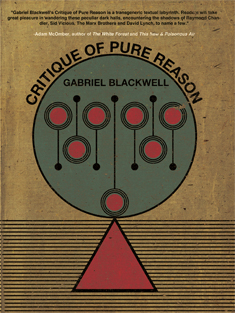
Blackwell’s diction and form so closely mirrors what we’d expect in an actual Bush-era interrogation brief that I wouldn’t be surprised if bits and pieces were lifted verbatim from actual leaked memos. I say this not to accuse Blackwell of plagiarism (he’s much too inventive to slouch to anything so prosaic) but to marvel at his tight, legalistic prose.
“Evidence suggests that pressure on the heel [of a detainee] while held in this position causes chronic, fulgurant pain in the detainee when so held for the recommended 24 out of 28 hours. Musculature of the leg must be kept tensed in this position to relieve pressure on the calcaneus, reducing the likelihood of the contravention of auxiliary protocol(s) and retarding decomposition and atrophy.
“[…] detainees may be held so immobilized for as much as 86 per cent of time under detention, or 24 out of 28 hours, with an upper limit of 28 out of 28 hours, provided detainees are given inadequate or nonexistent nutriment, a median ambient temperature of 55 degrees Fahrenheit is maintained, and all such periods occur consecutively.”
Go ahead. Read those paragraphs over again. An upper limit of 28 out of 28 hours? Inadequate or nonexistent nutriment? Who amongst us would be surprised if this came from an actual US DOJ memo outlining the treatment of Guantanamo Bay detainees?
“A Night at the Opera” however is not just another humorless diatribe on Bush-era crimes, for it bristles with wit. Blackwell is a master ventriloquist, nailing perfectly the Marx Brothers’ voices.
Consider Groucho’s response when asked about how long he can undergo the above-mentioned enhanced interrogation techniques:
“[Detainee Marx, Groucho reports that he could go 29 out of 28 hours if you gave him a head start and a broken clock; oh, and while you’re at it, he wants to see his lawyer; more than that, though, he wants to see the Cubs win one; more than that, though, he wants to see his wife again; more than that, he wants to see your wife again.]”
Here’s Chico, adlibbing after his interrogators discuss “auxiliary protocols”:
“[Detainee Marx, Chico reports he knows a pro to call, but she-a charge too much]”
And Harpo, not to be outdone, appears as well:
“Detainee Marx, Harpo, questioned separately and simultaneously, removed administrator’s headgear and attempted to set fire to it.”
Now, I admit being a Marx Brothers aficionado, and it’s possible that people lacking a passing knowledge of their personas will be mystified by the story’s references, but the Marx Brothers’ shenanigans underscore the absurdity of what the real-life US DOJ was perpetrating. Parts of the story work like a scientific lab report (à la George Saunders’s “93990”). Overall, the story is chilling and, in its way, believable, a perfect piece of social commentary that both entertains and causes us to think of the greater issues at hand.
I had hoped to review CRITIQUE OF PURE REASON (thoroughly solid collection that works in a myriad of modes, models, and styles) when it was first published but my relationship inexplicably collapsed at the outfit that I thought was going to run the review.
Hell, Blackwell even redacts parts of the ersatz DOJ memo as the story progresses. What’s not to like about that?
~~~
A while back, shortly after reading CRITIQUE OF PURE REASON, I fell into a bit of a depression. “A Night at the Opera,” or, rather, the world’s failure to take notice of it, was the reason for my funk. It galled me that the story hadn’t received greater acclaim. It should have been reprinted in the major anthologies, talked about on countless lit blogs, been on the lips of everyone who cares about innovative fiction. In short, it should have made a star out of Gabriel Blackwell.
“A Night at the Opera” is a dazzling, dizzying whirlwind. The story totally put me to sea. As a writer who kids himself into believing he’s written a couple of half-decent stories, I was in awe of Blackwell’s talent. I felt like one of Leonardo’s lesser contemporaries gandering a look La Gioconda for the first time and realizing, by comparison, the inadequacy of my talents. I wanted to bow down before him and hail my hosannas.
Reading this story again tonight, I felt that same dizzying respect. Consider this blog post a hosanna. And do yourself a favor: search out this story, and search out CRITIQUE OF PURE REASON.
 RSS Feed
RSS Feed
